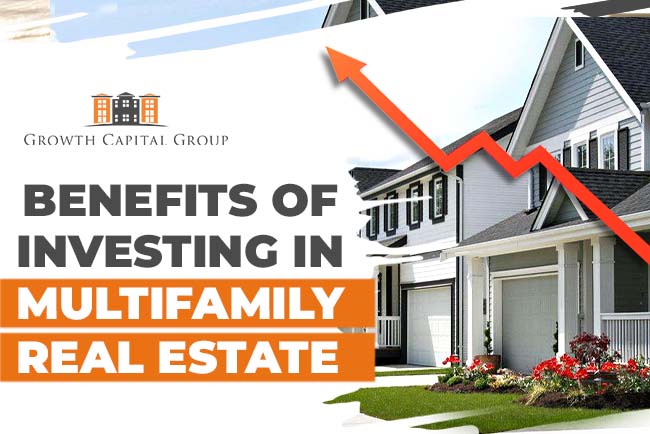You’re considering investing in multifamily real estate. There are several compelling reasons and benefits of investing in multifamily real estate. you might want to focus on a certain sort of property: the multi-family home, regardless of whether you’re hoping to become the next real estate billionaire or simply need a duplex to help pay your mortgage.
Multifamily real estate, as the name suggests, contains multiple family units within a single structure or complex (as opposed to a single-family dwelling). Although they come with a lot of potential for income and property growth, they also come with additional responsibility and risk.
Let’s discuss the positives of investing in multi-family properties.
What Does Investing In Multifamily Real Estate Consist Of?
Multiple independent dwelling units are combined to form a multi-family home or complex. Each apartment has its own address, a separate entrance, and living spaces from the other units. There are numerous separate households/tenants, but there is only one building owner, who may be a person or a business.
Multifamily properties already make up more than 30% of all housing in the United States, so there is a lot of room for growth as well as opportunities for investment. These kinds of residences serve as income producers for the investor by providing consistent cash flow from the rent the tenants pay. Additionally, there is a chance that the value of the real estate will increase over time.
Types of multi-family buildings
There are many different types of multi-family dwellings, ranging in size from two to 2,000 units. You can invest in a variety of multifamily properties, including:
- Triplexes, quadplexes, and duplexes– These properties, in that order, have two, three, or four units. This kind of property might be “house-hacked” by allowing you to live in one unit while renting out the rest. These are frequently eligible for standard mortgages or owner-occupied financing.
- Apartments – Apartment complexes are multi-unit structures that are owned by a single party. Usually, management is present. This kind of property requires financing through a business loan.
- Condominiums – Although they can also take the form of town- or row houses, condos frequently resemble flats. Contrary to apartments, which are typically rented out, condos are privately owned, while the common areas are shared and overseen by a homeowner’s organization (made up of the condo residents).
- Mixed-Use – A multifamily building with mixed uses mixes living space with retail, business, leisure, or cultural venues. Housing for students. These complexes, which are located close to institutions, are made with students in mind.
- Age-Restricted – These kinds of multi-family residences typically only allow those 55 and older to live in them. The structures, amenities, features, and activities are designed with this age range in mind.
- Income-Restricted – Those with lesser incomes can purchase a property with the support of subsidised housing. To construct these units, the federal government frequently collaborates with developers. If you make an investment in this kind of real estate, you might be eligible to accept federal housing choice vouchers.
Benefits of Investing In Multifamily Real Estate
Comparing multifamily investment properties with other types of investment properties, there are certain clear advantages.
- Increase revenue
MultiFamily homes are built to generate income. Each unit’s space is utilized as well as possible to increase renter traffic and revenue. Compared to renting a single-family home, they can provide significantly more income.
- Quickly increase your real estate portfolio
Multifamily properties could help you amass a significant number of units more effectively if you’re trying to become a serious real estate investor.
It’s much simpler to manage because you can invest in bigger deals and buy more units rapidly, according to Pineda. “You acquire a multi-family property with 20 or even 200 units in one transaction, rather than having to buy and renovate 20 single-family homes and manage 20 distinct loans.”
The Incredible Tax Benefits of Multifamily Investing
- Strategically boosting the property’s worth
Investors who purchase multi-family real estate also have the chance to benefit from capital growth should they ever decide to sell. Since the value of the property is determined by how much net operational income you have rather than by how much the apartment next door You are rewarded according to how much money you can produce, and there are clever ways to generate income and boost the worth of a property, such as cutting vacancies, raising rents, or improving it.
- Reduce your living expenses
Investors in multi-family buildings with four units or fewer frequently occupy one of the units, making them eligible for owner-occupied financing (which is similar to a regular residential mortgage and comes with a lower interest rate). Of course, they don’t pay rent (or pay it to themselves).
- Compared to other investments, less risky
Even during economic downturns, multi-family property often provides investors with predictable cash flow and lower risk. After all, everyone requires a place to live. Recessions have a greater impact on other real estate categories, such as industrial, retail, and office space, so they pose a greater danger.
Related Medical Professionals Are Investing In Multifamily Properties
Conclusion
A unique way to increase your investment portfolio and produce income is through multi-family real estate investing. Now would be a fantastic time to invest in multifamily properties if you were thinking about it! To learn more about our current multifamily investment possibilities, please contact us at Growth capital group if you’re interested in learning how to start investing in multifamily through real estate syndications.

